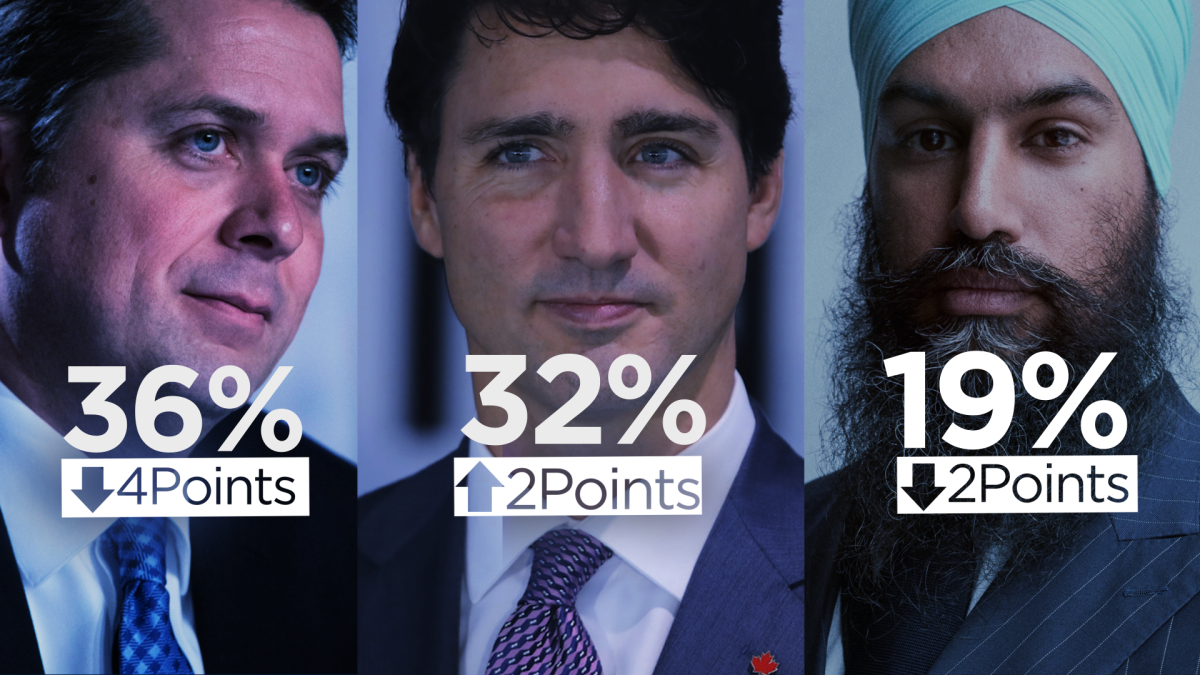Nearly a month has passed since Jody Wilson-Raybould and Jane Philpott were kicked out of the Liberal caucus amid the SNC-Lavalin affair, and according to an exclusive Ipsos poll done for Global News fortunes could be changing for both of Canada’s leading parties.

The Conservatives and Liberals are locked in a tight race across the country — Andrew Scheer’s party is polling at 36 per cent, while Prime Minister Justin Trudeau’s team is at 32 per cent in a poll that Ipsos considers accurate to within 3.5 percentage points.
WATCH: April 11 — The differences between Canada’s urban and rural voters

The Liberals are up two points since the end of March — within the margin of error — while the Conservatives are down four points, which is just outside the margin.
That’s after three straight polls that showed the Conservatives ahead, with the gulf growing to as many as 10 points.
READ MORE: Trudeau’s personal brand continues to tarnish, new poll suggests
The lead appears to have diminished in the past month, and that likely has less to do with Wilson-Raybould and Philpott’s departures from caucus than the fact that the government has “shut down all the official opportunities for people to continue talking about this issue,” Ipsos CEO Darrell Bricker told Global News.
“Both Jody Wilson-Raybould and Jane Philpott said they have more to say about this,” Bricker said.
“But unless they can find a venue in which to say it, they’re probably not going to be able to keep this scandal alive as they were in the space of the last couple of months.”
The Conservatives and the Liberals appear to be in a dead heat in Ontario, at 34 per cent each.
The Liberals have a lead in Quebec of 33 per cent to 26 per cent, and in British Columbia, where they have 42 per cent to the Conservatives’ 23 per cent.
Conservatives, however, hold a “commanding lead” in Alberta (63 per cent to 23 per cent), and large ones in Saskatchewan and Manitoba (51 per cent to 27 per cent).
They also lead the Liberals in Atlantic Canada by a margin of 41 per cent to 26 per cent, a palpable change from 2015, when Trudeau’s party took every seat in the region.
“There’s a lot of anxiety out there right now about the economy in particular,” Bricker said.
“They’re anxious about the direction of the country, and I think in Atlantic Canada, people are starting to, after having raised their expectations so high as a result of the last election, starting to question whether or not the government’s actually delivered.
“They’ve got six months to demonstrate that they have, but as we’ve seen, in Prince Edward Island (P.E.I.) the other night, people are starting to turn blue in Atlantic Canada.”
READ MORE: Seat projection shows Trudeau Liberals slip out of majority position
The Progressive Conservatives took the most seats in a minority government in P.E.I. on Tuesday night.
The Liberals could face another test when Newfoundland and Labrador goes to the polls on May 16, Bricker noted.
The federal Conservatives appear to have lost ground in two provinces: B.C. and Ontario.
When it comes to the West Coast, respondents there could be feeling “all the very heated rhetoric” when it comes to the Trans Mountain pipeline, Bricker said.
“It’s not unexpected that Conservative parties would be suffering in B.C.,” he said.
Meanwhile, in Ontario, the Conservative brand has been “affected by people’s reactions to the provincial government and Doug Ford.”
“When you’re at the start of an administration, starting to do controversial things, people start to have a reaction,” Bricker said.
“I think we’ve gone through the euphoria of an election campaign and we’re now dealing with what the government said it had to do, and some of those things it has to do are pretty difficult.”
WATCH: March 28 — Support for Liberals slips to 30 per cent, according to poll

But the Conservatives could also have a national advantage: a splintered progressive vote.
Not necessarily because of the NDP, Bricker said, but because of the Green Party, which polled at 14 per cent in Atlantic Canada.
“I think the Green Party’s probably hurting the Liberal Party more than it’s hurting anybody,” Bricker said.
“Whenever the progressive vote fragments, so whenever people who are on the left of the political spectrum don’t vote en masse for either the Liberals or the NDP, for example, when that fragments, that’s when the Conservatives have a big advantage.”
Meanwhile, the People’s Party of Canada (PPC) doesn’t appear to be posing much of a challenge for the Conservatives.
“We haven’t been registering them as showing anything,” Bricker said.
The PPC has registered at one or two points in other polls, but at this point “they’re really not a factor,” he added.
METHODOLOGY
Exclusive Global News Ipsos polls are protected by copyright. The information and/or data may only be rebroadcast or republished with full and proper credit and attribution to “Global News Ipsos.” This poll was conducted between April 23 and 25, 2019, with a sample of 1,000 adults living in Canada. The precision of Ipsos online polls is measured using a credibility interval. This poll is accurate to within +/ – 3.5 percentage points, 19 times out of 20, had all Canadian adults been polled.
- Freeland set to table 2024 federal budget in the House of Commons
- Budget 2024 tries to sell youth a more affordable life with billions in spending
- Budget 2024 commits $5B for Indigenous loan guarantees, but falls short on infrastructure
- Budget 2024, by the numbers: Here’s how spending is being divvied up





Comments